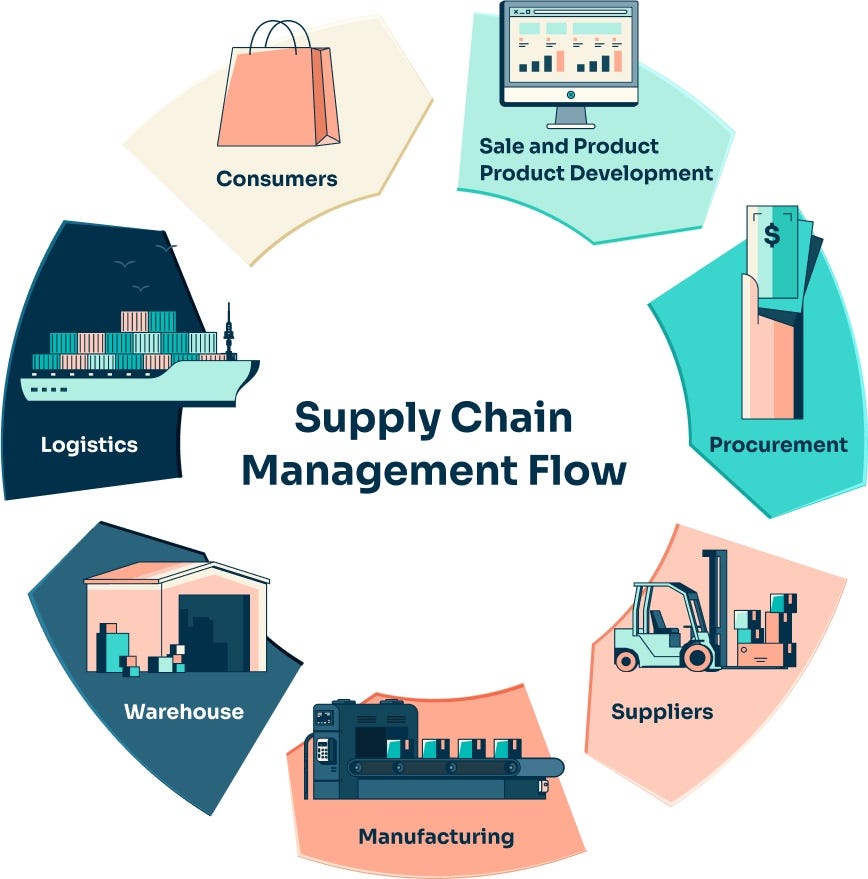Supply chain management (SCM) encompasses planning, coordinating, and overseeing every activity involved in sourcing, producing, and delivering goods or services. It ensures that materials flow smoothly from suppliers to manufacturers, then to distributors and retailers, before finally reaching the end customer.
Effective SCM involves careful balancing—optimizing inventory to meet demand without excess, selecting reliable suppliers, and coordinating transportation and warehousing. By fostering collaboration, improving visibility, and streamlining operations, supply chain management creates a stable foundation for business growth, customer satisfaction, and competitive differentiation.
Prerequisites for Supply Chain Management
- Organizational Alignment:
SCM requires cross-functional collaboration. Marketing, procurement, logistics, and finance teams must align on objectives. - Data Accuracy and Integration:
Clean, accessible data from ERP, CRM, and inventory systems supports timely decisions and transparency. - Analytical and Forecasting Skills:
Understanding trends, using demand forecasting methods, and applying analytics helps anticipate needs and prevent disruptions. - Supplier and Partner Relationships:
Strong ties with trustworthy suppliers and logistics providers ensure smooth operations and reduce risks.
What Is Supply Chain Management?
Supply chain management coordinates the flow of materials, information, and finances across the entire supply network. It extends beyond a single organization, linking suppliers, manufacturers, distributors, and customers.
SCM involves strategic planning (choosing suppliers, selecting distribution channels), tactical decisions (managing inventory, scheduling production), and operational tasks (processing orders, handling returns). By optimizing these steps, companies can deliver products efficiently, minimize costs, and respond quickly to changing market conditions.
Why Is It Important?
- Cost Control: Well-managed supply chains lower expenses in inventory, transportation, and warehousing.
- Reliability: Ensuring products are available when needed builds trust and loyalty among customers.
- Flexibility: A robust supply chain adapts to shifts in demand, supply disruptions, and new opportunities.
- Strategic Advantage: Businesses that excel at SCM differentiate themselves through speed, quality, and service.
What Is Supply Chain Management Used For?
- Demand Planning: Predicting customer demand to maintain optimal inventory levels.
- Procurement: Selecting suppliers, negotiating contracts, and ensuring consistent materials supply.
- Production Scheduling: Aligning manufacturing capacity with forecasted demand to avoid bottlenecks.
- Logistics and Distribution: Managing transportation, warehousing, and order fulfillment to minimize delays and costs.
The Supply Chain Management Lifecycle
- Planning and Forecasting:
Determine what products are needed, in what quantities, and by when. Use historical data and market insights to inform decisions. - Sourcing and Procurement:
Choose suppliers based on cost, quality, and reliability. Negotiate contracts and establish performance metrics. - Production and Assembly:
Coordinate manufacturing schedules, ensure quality control, and synchronize production with component availability. - Distribution and Logistics:
Transport products efficiently, manage warehouses for quick retrieval, and deliver goods to distribution centers or retail locations. - Returns and Reverse Logistics:
Handle product returns, repairs, or recycling, ensuring minimal waste and maintaining customer satisfaction.
Tools and Techniques
- Enterprise Resource Planning (ERP): Integrates key business processes, providing a unified view of orders, inventory, and finances.
- Advanced Planning and Scheduling (APS): Optimizes resource allocation, helps balance supply and demand.
- Transportation Management Systems (TMS): Coordinates inbound and outbound shipping, selecting carriers and routes for cost-effectiveness.
Applications and Use Cases
- Consumer Goods: Ensuring shelves remain stocked during seasonal demand surges.
- Automotive: Coordinating just-in-time parts delivery to manufacturing lines.
- Pharmaceuticals: Maintaining product integrity and regulatory compliance throughout the supply chain.
- Technology Products: Efficiently managing global suppliers and complex component sourcing.
Benefits for Business
- Improved Margins: Reduced operational inefficiencies save money and enhance profitability.
- Customer Satisfaction: Reliable, on-time delivery cultivates brand loyalty and repeat business.
- Risk Management: Diversifying suppliers and maintaining safety stock can help mitigate disruptions.
- Sustainability: Efficient SCM reduces emissions, conserves resources, and aligns with environmental goals.
What Is a Supply Chain Manager?
A supply chain manager is responsible for planning, coordinating, and optimizing the flow of goods and materials. They collaborate with internal teams and external partners, oversee logistics, track performance, and identify areas for improvement. Their goal is to ensure that the supply chain supports strategic goals, satisfies customers, and enhances the company’s bottom line.
Supply chain management is the backbone of successful businesses, ensuring smooth, cost-effective operations from raw material sourcing to final delivery. By integrating strategic planning, advanced technologies, and collaborative relationships, SCM enables organizations to meet customer expectations, adapt to market changes, and secure a competitive advantage.
FAQs
Can smaller companies implement effective supply chain management?
Yes. Even basic SCM practices—like accurate forecasting and reliable supplier selection—provide significant benefits.
How does technology support supply chain management?
Technologies like ERP, TMS, and analytics platforms improve visibility, streamline processes, and help make data-driven decisions.
What’s the difference between supply chain management and logistics?
Logistics is a component of SCM focused on transportation, warehousing, and distribution. SCM is broader, encompassing procurement, production, and overall flow.
Is sustainability a concern in supply chain management?
Increasingly so. Companies leverage SCM to reduce waste, emissions, and resource consumption, aligning with environmental and social responsibilities.

